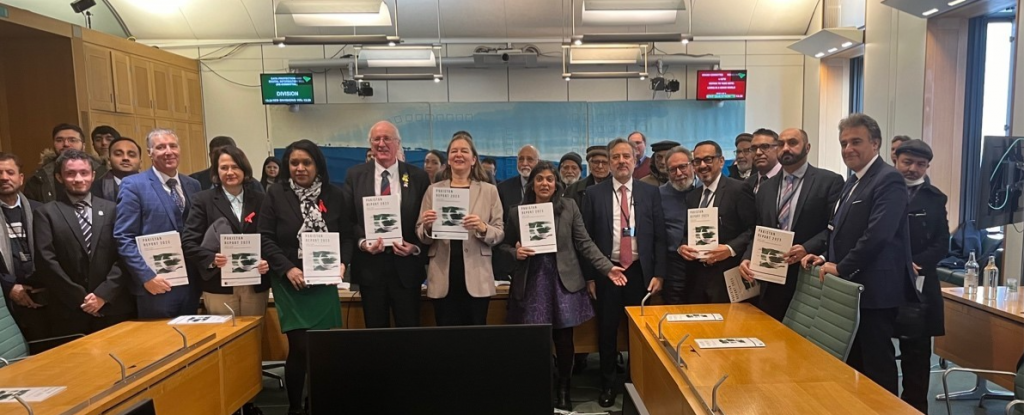The All-Party Parliamentary Group (APPG) for Freedom of Religion or Belief (FoRB), launched its Pakistan Report on 29 November in the UK Parliament. This report follows the February 2023 visit to Pakistan by the delegation.

The APPG’s report highlights systemic state-sponsored persecution of Ahmadi Muslims. It notes:
- a slight improvement for Christians and Hindus, but the persecution of Ahmadi Muslims has drastically worsened, marked by arrests, jailings, and charges under anti-Ahmadi and blasphemy laws;
- since 2021, violent attacks against Ahmadis spiked, with a tenfold increase in blasphemy cases. It links the rise of Tehreek-e-Labbaik Pakistan (TLP) to increased persecution, creating an atmosphere of fear and violence. The report details attacks on Ahmadi graves, mosques and individuals, with complicity from non-state actors and state authorities;
- the rise of violent hate speech and that many Pakistani officials are unwilling to take positive action, underscoring the complicity of state officials in enforcing discriminatory measures like mandatory declarations of faith and national curriculum changes, and the misuse of cyber laws, leading to censorship and persecution of Ahmadi Muslims;
- Pakistan is not safe for Ahmadi Muslims, detailing the harrowing conditions they face;
- the shocking anti-Ahmadi statements from people like (Hafiz) Tahir Mehmood Ashrafi.
- states “It is clear that Ahmadi Muslims are targeted solely due to their religious identity. The conditions inflicted upon the group clearly result in serious bodily and mental harm to its members and could amount to efforts to physically destroy the cultural and religious heritage of Ahmadi Muslims in Pakistan. If intent can be proven, then this may meet the standards laid down in Convention on the Prevention and Punishment of the Crime of Genocide.”
- the Human Rights Commission of Pakistan is alarmed by new amendment to blasphemy laws, fearing it will disproportionately harm religious minorities through false accusations and persecution. It notes a rise in blasphemy cases, harsher sentences, and mob killings highlight a disturbing trend;
- the misuse of blasphemy laws for personal vendettas and political agendas. The government acknowledges issues but avoids addressing root causes;
- Pakistan needs to implement safeguards and monitoring mechanisms for blasphemy allegations;
- concerns about the widespread abduction, forced marriage, and forced conversion of women and girls from Christian and Hindu communities in Pakistan;
- the scale of forced marriage is difficult to determine, with estimates of around 1,000 victims per year. The report emphasises that the practice, denied by some, is widespread, as evidenced by survivor accounts, court documents, and interviews with lawyers. It criticises the rejection of the Anti-Forced Conversion bill in October 2021; and
- that the UK banned cleric Mian Abdul Haq for his role in forced conversions, urging similar action by allies. Recommendations include the need to criminalise forced conversion, the establishment of a national helpline, and the creation of safe spaces for victims. The report calls for the implementation of legal safeguards and the protection of victims.
You can read the full report HERE.
Source: Ahmadiyya Muslim Community UK.
